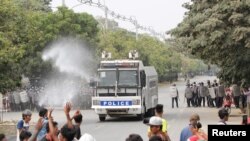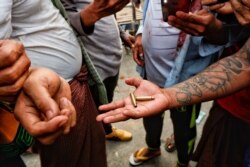At least two people were killed by gunfire in Myanmar Saturday as security forces used live and rubber bullets, tear gas, water cannons and slingshots against protesters who were demonstrating against the military’s Feb. 1 coup.
Some 500 police and soldiers gathered at a shipyard in Myanmar’s second largest city of Mandalay to disperse workers and other demonstrators, sparking an hours-long face-off during which protesters launched catapults at police.
Security forces dispersed the crowd with gunfire and other forms of force, leaving two dead and 20 others injured, according to the Irrawaddy news website and a leader of the Parahita Darhi volunteer emergency service agency, Ko Aung.
Demonstrators, area residents and journalists reportedly fled the area as security forces chased after them, attacking one group of journalists with slingshots and tear gas.
Security forces have grown increasingly aggressive against the protesters, who have clashed with Myanmar security forces since the military detained de facto leader Aung San Suu Kyi and other high-ranking officials of the civilian government on February 1. The military declared a one-year state of emergency, citing widespread fraud in last November’s general elections, won in a landslide by Suu Kyi’s National League for Democracy.
The military’s claims were rejected by Myanmar’s electoral commission.
U.S. State Department spokesman Ned Price said the United States was "deeply concerned" by reports that security forces had fired on protesters and continued to detain and harass demonstrators and others.
"We stand with the people of Burma," Price wrote on Twitter. Myanmar is also known as Burma.
Britain said it would consider further action against those involved in violence against protesters, and the French foreign ministry called the violence "unacceptable."
"The shooting of peaceful protesters in Myanmar is beyond the pale," British Foreign Minister Dominic Raab said in tweet. "We will consider further action, with our international partners, against those crushing democracy & choking dissent."
Tens of thousands of demonstrators have since filled the streets of Myanmar’s biggest cities in defiance of a strict curfew and a ban on gatherings of more than four people, holding signs with pro-democracy slogans, many of them with pictures of Suu Kyi. They’ve raised a three-finger salute as they marched, a sign of resistance against tyranny as depicted in the popular “Hunger Games” movies.
In addition to protests, government employees and civil servants are on strike, resulting in disruptions to train services throughout the country, also known as Burma. The military has ordered civil servants back to work and threatened action against them. A growing number of workers from other sectors, including medical personnel, have walked off their jobs in recent days.
Senior General Min Aung Hlaing, who led the coup, promised last week in a nationally televised speech that new elections would be held to bring what he called a "true and disciplined democracy,” but he did not specify when they would take place.






